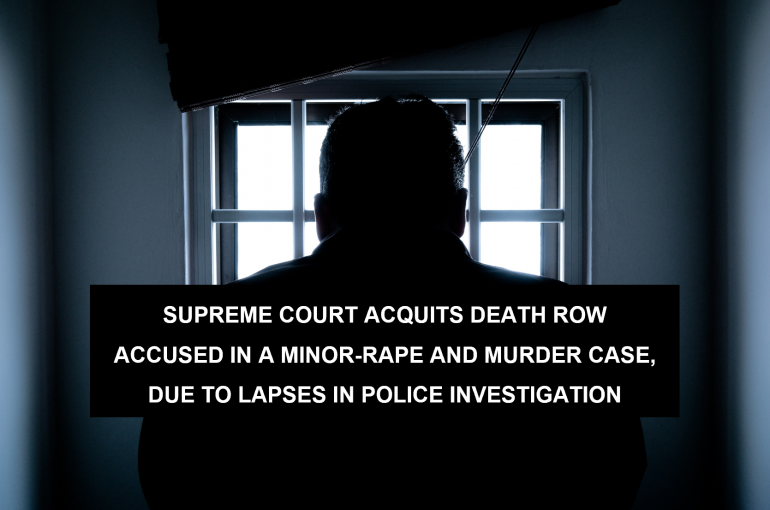SUPREME COURT ACQUITS DEATH ROW ACCUSED IN A MINOR-RAPE AND MURDER CASE, DUE TO LAPSES IN POLICE INVESTIGATION
A Three Judge Bench of the Supreme Court comprising of Justice B.R. Gavai, Justice Vikram Nath and Justice Sanjay Karol passed a Judgment dated 19.05.2023 in ‘Prakash Nishad v State of Maharashtra, Criminal Appeal Nos. 1636-1637 of 2023’, and acquitted the Accused-Appellant from the charges of murder and rape of a minor girl due to inconclusive and yawning gaps in the chain of events.
Facts:
In the present case, a six-year-old girl (Victim) was found dead in a gutter (Nala) near her residence in Thane, Maharashtra on 12.06.2010. The Thane Police officers had sent the body of the Victim to a Medical Officer, Dr. Anjali Pimple (PW4) for medical examination. The medical reports revealed that the Victim was sexually assaulted, seriously injured and was murdered.
The father of the Victim (PW1) suspected one; Prakash Nishad (Accused-Appellant) to have committed the crime, as the Accused-Appellant resided in the same colony as the Victim. Based on this suspicion, the Investigating Officer (IO) investigated and arrested the Accused-Appellant in the presence of a few witnesses. According to the investigation of the IO, the Accused-Appellant had sexually assaulted the Victim and murdered her. The IO further stated that the Accused-Appellant threw the Victim’s body in a nearby gutter in an attempt to destroy evidence.
The Accused-Appellant was charged under the following provisions of the Indian Penal Code, 1860 (IPC):
i) Section 376 IPC – Punishment for Sexual Assault
ii) Section 302 IPC – Punishment for Murder
iii) Section 201 IPC – Causing disappearance of evidence of offence, or giving false information to screen offender.
The Ld. District and Sessions Court, Thane (Trial Court) passed an Order dated 27.11.2014 in Sessions Case No.407 / 2010, and convicted the Accused-Appellant and imposed death sentence under the above-mentioned charges. The Trial Court filed Criminal Confirmation Case No.4 / 2014 before the Hon’ble High Court of Bombay (High Court) for confirmation of the Accused’s death penalty.
Aggrieved by the Trial Court Order dated 27.11.2014, the Accused-Appellant filed an Appeal in the High Court in Criminal Appeal No.88/2015. The High Court vide Common Order dated 14.10.2015 affirmed the findings of the Trial Court and confirmed the death penalty.
Aggrieved by the High Court Order dated 14.10.2015, the Accused-Appellant filed Criminal Appeal Nos. 1636-1637 of 2023 before the Supreme Court seeking setting aside of the conviction and death penalty.
Supreme Court Observations:
The Apex Court dealt mainly with the following three issues, namely:
(a) If the recording of disclosure statement made by the Accused-Appellant that led to the recovery of incriminating material against him, in a language unknown to him i.e. in Marathi, proved to be prejudicial?
(b) Can DNA evidence form the solitary basis for determining guilt?
(c) Did the Prosecution succeed in proving the circumstantial evidence beyond all possible doubt?
The Supreme Court made the following observations:
1) That, in the present case, the Prosecution relied entirely on circumstantial evidence to establish the guilt of the Appellant, due to the absence of eyewitness(s). The Apex Court stated that the Investigating Officer recorded the disclosure statements in Marathi and failed to read them over to the Accused-Appellant in his vernacular language, which is Hindi. The Bench observed that failing to comply with a statutory safeguard was indeed prejudicial to the Accused-Appellant causing him injustice. The Bench further observed that, in any case, the Authorities must arrange for proper interpretation in a language that the Accused understands.
2) That there was nothing on record to establish who had taken the samples of the Accused-Appellant for forensic analysis and on what pretext were the samples collected from him. The Apex Court observed that according to Section 53A of the Code of Criminal Procedure 1973 (P.C.) – (Examination of person accused of rape by medical practitioner), it is the duty of the doctor to examine and collect the necessary samples for testing. But in the present case, the police officials failed to testify if they had complied with the statutory provisions of Section 53A Cr.P.C. along with the formalities of keeping the samples safe and secure. As the person who had taken the samples was not a doctor nor a witness to the present case, the Bench held that the police officials failed to comply with statutory requirements.
3) That there were yawning gaps in the chain of circumstances, rendering it far from establishing the guilt of the Appellant. The Apex Court stated that due to the said glaring error, there were numerous lapses blotting the entire map of sequences. The Bench pointed out several broken chains in the occurrence of events and mentioned that whosoever committed the crime in this case remains unpunished to this day.
4) That the duty of the investigating authorities was not only to protect the citizens but was also to ensure fair and proper investigation of the crimes affecting the society. The Supreme Court held that the crime committed against the innocent six-year-old child was malum in see. evil and wrong and it was the moral duty of the Authorities to take all possible steps within the law to bring the acts of the offenders to light
Conclusion:
Thus, applying the aforementioned observations to the present case, the Apex Court, vide Order dated 19.05.2023, quashed the death sentence imposed on the Appellant that was confirmed by the High Court of Bombay in Order dated 14.10.2015. As a result, the Supreme Court acquitted the Accused-Appellant, who was on a death row for last 8 years.
Shalini Donthi
Legal Associate
The Indian Lawyer





































Leave a Reply